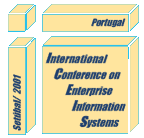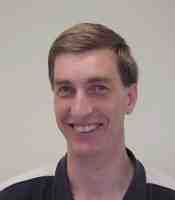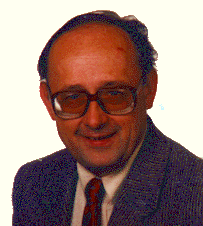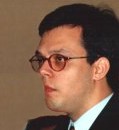 Keynote Lectures
Keynote Lectures Keynote Lectures
Keynote Lectures |
Utrecht University - Institute of Information and Computing Sciences Main interests in the area of formal specification of reliable and flexible communications between autonomous systems. A major area in which autonomous systems are used is that of software agents. Coordinator of an Electronic Commerce research program at the TUE and Tilburg University called "Enabling Electronic Commerce". Technical coordinator of the ESPRIT project MEMO, which aims at providing integrated support for electronic commerce for Small and Medium sized Enterprises. email: dignum@cs.uu.nl web page: http://www.cs.ruu.nl/staff/dignum.html |
 |
Research Staff member of the MIT Laboratory for Computer Science (MIT-LCS), Dr. Greene completed his PhD in Theoretical Physics at the University of Toledo in 1973. Since he joined the MIT-LCS in 1986, he has worked on a variety of computer projects. For the period 2000 - 2002, Dr. Greene is on leave from MIT to the National Science Foundation. He is Senior Program Director for Advanced Networking Infrastructure in the ANIR division of the CISE directorate of the NSF. Recently working with Tim Berners-Lee he helped establish at MIT-LCS the World Wide Web Consortium (W3C), building both consortium membership and the world wide team membership. Prior to that he managed the MIT-LCS Project SCOUT 128 node CM5 super computer, used by LCS Computer Scientists and Physicists, Biologists, Oceanographers and other computational scientists at MIT, Harvard and BU. Dr. Greene's computer career activities have spanned the time from Main Frames to minicomputers, to workstations, to personal computers to the present Internet world of the World Wide Web. email: tjg@hq.lcs.mit.edu |
 |
His first two degrees were in Mathematics (Harvard and MIT); a decade later, a PhD in Descriptive Linguistics from the University of Pennsylvania. In 1953, together with the late William J. Turanski, he developed the world's first programming environment (known as "Generalized Programming"); it ran on UNIVACs I and II. In the '60s and early '70s he helped to develop and promote Petri nets. In 1979, together with Paul Cashman, he developed the world's first "coordination system"; it ran on the ARPANET to support military software development. Anatol Holt has engaged in many R&D activities, sponsored by the Airforce, ARPA, and industry. More recently, in Milano Italy he has been teaching and writing books: "Organized Activity and Its Support by Computer" (Kluwer Academic Publishers, Dordrecht Holland), and "Ripensare il Mondo - il Computer e Vincoli Sociali" (Dunod/Masson, Paris). email: aholt@est.ips.pt web page: http://ltodi.est.ips.pt/aholt |
 |
Gio Wiederhold is a professor of Computer Science at Stanford University, with courtesy appointments in Medicine and Electrical Engineering. Since 1976 he has supervised 30 PhD theses in these departments. Current research includes privacy protection in collaborative settings, large-scale software composition, access to simulations to augment decision-making capabilities for information systems, and developing an algebra over ontologies. Wiederhold has authored and coauthored more than 350 publications and reports on computing and medicine, including an early popular Database Design textbook. He initiated knowledgebase research through a white paper to DARPA in 1977, combining databases and Artificial intelligence technology. The results led eventually to the concept of mediator architectures. Wiederhold was born in Italy, received a degree in Aeronautical Engineering in Holland in 1957 and a PhD in Medical Information Science from the University of California at San Francisco in 1976. Prior to his academic career he spent 16 years in the software industry. His career followed computer technologies, starting with numerical analysis applied to rocket fuel, FORTRAN and PL/1 compilers, real-time data acquisition, a time-oriented database system, eventually becoming a corporate software architect. He has been elected fellow of the ACMI, the IEEE, and the ACM. He spent 1991-1994 as the program manager for Knowledge-based Systems at DARPA in Washington DC. He has been an editor and editor-in-chief of several IEEE and ACM publications. email: gio@cs.stanford.edu web page: http://www-db.stanford.edu/pub/gio/personal/ |
 |
Giorgio De Michelis - Presentation Giorgio De Michelis teaches Theoretical Computer Science and Information Systems at the University of Milano - Bicocca. He is carrying out research on models of concurrent systems (Petri Nets) and on Computer Supported Cooperative Work, where he has developed and is developing prototypes of support systems for cooperative processes (CHAOS, UTUCS, MILANO, KLEE&CO). He is responsible of the Cooperation Technologies Laboratory at the Dipartimento di Informatica, Sistemistica e Comunicazione (DISCO) of the University of Milano - Bicocca. Giorgio De Michelis is member of the Steering Committee of the Community of Petri Nets. He has served several times as program committee chairman or member of the International Conferences on Application and Theory of Petri Nets. Giorgio De Michelis has repeatedly served as program committee member for both the CSCW and the ECSCW conferences and for related conferences in Europe and in the US. He has served as Program Committee Chair of the ECSCW'93 in Milano. He is member of the editorial board of 'Computer Supported Cooperative Work: The Journal of Collaborative Computing', 'Studi Organizzativi', 'Pluriverso'. From 2000 he is writing a periodical column on the i3 Magazine. Giorgio De Michelis has authored four books and more than hundred papers in the areas of his interest. Giorgio De Michelis is vice-presidente of IRSO, an Italian research and consultancy firm specialized in change management with particular attention to information systems planning, professional exploitation systems, business process reengineering, socio-technical systems design. He is member of the board of the Museo Nazionale della Scienza e della Tecnica, and gives his advice to several ministries and public institutions. Giorgio De Michelis has been responsible of the Milan University unit within the ESPRIT Project ITHACA; he has been member of the PMC of the ESPRIT BRA Project COMIC and of the Open LTR ESPRIT Project DESARTE; he has participated in the ESPRIT BRA Project DEMON and in the ESPRIT BRA Working Group, CALIBAN. He has been chairman of the management committee of the COST Action 14 - CO-TECH, involving more than 70 research institutions all around Europe (1994-1996). He is member of the Coordinating Group of the i3 network and he has served as Chair of the i3 Annual Conference 2000, (September 2000, Joenkoeping (Sweden)). He is currently serving as referee of the Long Term Research (LTR) Proposals within the V Framework Program. His Laboratory is leading an LTR ESPRIT Project, CAMPIELLO, and is participating in the Esprit Project, KLEE & CO. email: gdemich@disco.unimib.it web page: http://www.cootech.disco.unimib.it/gdemich.html |
 |
Jean Bézivin is a professor of Computer Science at the University of Nantes, France. He got his Master degree from the University of Grenoble and PhD from the University of Rennes before spending several years, as an assistant professor, at the University of Brest. He also spent a year as a research fellow at the Queen's University of Belfast (Northern Ireland) and one year at the Concordia University of Montreal (Canada). He has been very active in Europe in the object-oriented community, starting the ECOOP series of conference (with Pierre Cointe), the TOOLS series of conferences (with Bertrand Meyer) and more recently the <<UML>> series of conferences (with Pierre-Alain Muller). He also organized several workshops at OOPSLA and ECOOP conferences like in 1995 on "Use Case Technology" and more recently in 1998 and 2000 on "Model engineering". He started in 1979 at the University of Nantes, one of the first Master programs in Software Engineering entirely devoted to Object Technology (Data Bases, Concurrency, Languages and Programming, Analysis and Design, etc.). He is an industrial consultant in the fields of object-technology, analysis and design, model engineering, etc. He published numerous papers on various subjects related to concurrency, software engineering, simulation, object technology, etc. He also presented tutorials on related subjects at several international conferences. His present research interests include object-oriented analysis and design, product and process modeling. |
 |
Nuno Cintra Martins started his research activities working on speech signal processing in the Institute of Systems and Computers (INESC-Portugal) and later he joined the Institute of Telecommunications at I.S.T.-Portugal. In 1995 he received a best paper award at the IMEKO TC-13 Int. Conference (The IEEE and the Slovak Academy of Sciences awarded this prize). From 1995 till 1997 he worked at the Institute for Systems and Robotics (I.S.R.), where he concluded his Master's Thesis and worked on projects in the area of System Identification and Signal Processing. From 1997 till 1999, he was conducting his research at the Control of Dynamic Systems Group of INESC in the area of Predictive Control of Nonlinear Systems. In 1998 he has been an invited co-author of 3 chapters on Fundamentals of Systems and Digital Signal Processing in the European Project "Leonardo da Vinci". Since September 1999, he is a Ph.D. candidate at LIDS-MIT working on his Ph.D. research in control theory applied to military resource distribution. Since September 2000 he is one of the organizers of the LIDS Colloquium at MIT. email: nmartins@mit.edu |
Page Updated on 10-10-2001